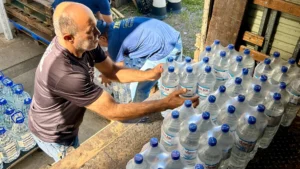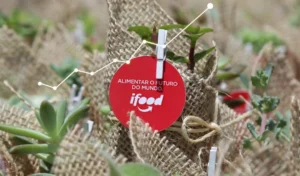#DeLivreDePlástico Commitment reached 130 million orders shipped without the material and advances to new stages
In July 2021, the iFood adhered to the #DeLivreDePlástico commitment, organized by the United Nations Environment Program (UNEP), the main environmental authority in the United Nations (UN) system, and by Oceana, the largest non-profit non-governmental organization focused on protecting our oceans.
iFood is the only delivery company in Brazil to join the initiative and has been holding meetings to monitor progress and results with UNEP and Oceana. This commitment has three phases, starting in 2022 and lasting until 2025 — find out what they are.
Phase 1: Reduction of single-use plastic items
In the first phase, iFood publicly committed to making optional for the customer to receive plastic items or not, in tune with your goal of ending plastic pollution by 2025. The result was that, in eight months, more than 130 million orders were delivered without sending single-use plastics, such as cutlery and straws, in the “Friends of Nature” campaign.
More than 40% of partner restaurants (120 thousand establishments) participate in the action, and 82% of consumers choose not to receive plastic items when asked when completing their order via the app. The next goal of Phase 1 of the pledge #PlasticFree is to reach, by December 2022, a share of 50% of restaurants registered with iFood.
Phase 2: Fewer bags, plastic packaging and sachets
In the second phase of the commitment, iFood will implement initiatives to reduce the use of plastic bags and condiment sachets in deliveries, in addition to replacing disposable plastic packaging with options that are easier to recycle and have a lower environmental impact.
A foodtech are already looking for solutions new packaging that will replace plastic, on iFood Shop, and through industry partners, such as Suzano.
To reduce plastic bags, the work plans are:
- 2022: gradual replacement of plastic bags in own market deliveries, bringing new plastic-free packaging options;
- 2023: expansion and encouragement of the use of plastic-free bags for restaurants and retailers operating on the platform;
- 2023/2024: offering consumers, during their in-app shopping journey, the possibility of choosing to have their order sent in plastic-free bags.
Work plan to reduce single-use plastic packaging:
- 2022: quantify the packaging that is on the market;
- From 2022: expand the offer of sustainable packaging for restaurants on the iFood Shop and improve its functionality, bringing more options to partners;
- From 2022: develop tactical plans for the technical and financial viability of the packaging chosen to make sustainable packaging more accessible to restaurants (opting for recyclable 100% solutions, preferably from renewable sources, biodegradable/compostable, with recycled and returnable content);
- 2023 and 2024: highlighting in the app, with filters and seals, restaurants that use sustainable packaging, making the choice easier for consumers.
And, for sachets, the work plan is:
- 2022: carry out studies on the supply (restaurants) and consumption (customer) of sachets in delivery;
- 2022: create a scalable in-app solution to avoid sending sachets and carry out the first tests to expand the tool;
- 2023: engage thousands of restaurants in the solution to reduce the sending of plastic sachets in the app.
Phase 3: Returnable packaging
In the third phase of the commitment with UNEP and Oceana, iFood will publish, by March 2023, the work plan and goals for the adoption of returnable and/or reusable packaging in its delivery operation, explaining how the execution will be of all actions in this plan.
Adjustments to reduction target dates
Following the #DeLivreDePlástico commitment schedule, in agreement and alignment with UNEP and Oceana, in July 2022 iFood will present the gradual reduction targets for the above items.


